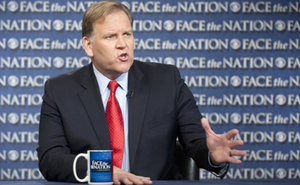SurveillanceRep. Rogers, House Intelligence chair: Russian intelligence may have helped Snowden
Representative Mike Rogers (R-Michigan), chairman of the House Intelligence Committee, said that Russia may have helped the former NSA contractor Edward Snowden to reveal details of surveillance programs and escape U.S. authorities last year. Rogers said he could reveal evidence which would support his claims, but suggested Snowden “used methods beyond his technical capabilities” and had help with his travel arrangements. Rogers’s comments were backed by Michael McCaul (R-Texas), chairman of the House Committee on Homeland Security. Senator Diane Feinstein (D-California), chair of the Senate Intelligence Committee, asked whether he was aided by the Russians, said: “He may well have.”

Congressman Rogers suspects Russian intelligence aided Snowden // Source: house.gov
Representative Mike Rogers (R-Michigan), chairman of the House Intelligence Committee, said on NBC’s Meet the Press on Sunday that Russia may have helped the former NSA contractor Edward Snowden to reveal details of surveillance programs and escape U.S. authorities last year.
Snowden was “a thief whom we believe had some help,” Rogers said, adding that there was an “ongoing” investigation into whether Russia had aided Snowden.
“I believe there’s questions to be answered there,” Rogers said. “I don’t think it was a gee-whiz luck event that he ended up in Moscow under the handling of the [Russian intelligence service] FSB.”
Rogers added: “Let me just say this. I believe there’s a reason he ended up in the hands, the loving arms, of an FSB agent in Moscow. I don’t think that’s a coincidence.
“We have questions that we have to answer but as someone who used to do investigations some of [the] things we are finding we would call clues that certainly would indicate to me that he had some help and he stole things that had nothing to do with privacy,” said Rogers.
Senator Diane Feinstein (D-California), chair of the Senate Intelligence Committee, also spoke on Meet the Press, saying Snowden had joined the NSA “with the intent to take as much material down as he possibly could.”
Asked whether he was aided by the Russians, Feinstein said: “He may well have. We don’t know at this stage. But I think to glorify this act is to set a new level of dishonor.”
The Guardian reports that Rogers’s comments were backed by Michael McCaul (R-Texas), chairman of the House Committee on Homeland Security. Speaking from Moscow, the Texas Republican told ABC’s This Week: “I believe he [Snowden] was cultivated by a foreign power to do what he did.”
McCaul said he could not “definitively” say it was Russia that helped Snowden. “Hey, listen, I don’t think … Mr Snowden woke up one day and had the wherewithal to do this all by himself. I think he was helped by others. Again, I can’t give a definitive statement on that … but I’ve been given all the evidence, I know Mike Rogers has access to, you know, that I’ve seen that I don’t think he was acting alone.”
Last August Snowden was granted temporary asylum in Russia after travelling to Moscow from Hong Kong. Last year, in an interview with the New York Times, Snowden said he did not take any of the documents he obtained to Russia, “because it wouldn’t serve the public interest.”
Snowden said there was “zero-percent chance” that Russia had received any documents and that he had handed all his NSA data to journalists from media outlets including the Guardian, before leaving Hong Kong. “What would be the unique value of personally carrying another copy of the materials onward?” he said.
Snowden has adamantly rejected charged that he had a relationship with foreign intelligence agencies.
Rogers did not offer evidence to support his claims, but suggested Snowden “used methods beyond his technical capabilities” and had help with his travel arrangements.
“He was stealing information that had to do with how we operate overseas to collect information to keep Americans safe … and some of the things he did were beyond his technical capabilities,” Rogers said.
Both Rogers and Feinstein used their appearances on Meet the Press to voice their doubts regarding some of the five proposals President Barack Obama made in a speech on Friday, in which he outlined a series of reforms to the NSA’s data collection practices (see “Obama announces reforms of U.S. intelligence data collection practices,” HSNW, 18 January 2014).
In his speech, Obama said the administration will work to have bulk phone metadata stored outside the government, to reduce the risk that such records would be abused; that it would require a special judge’s advance approval before agencies could examine an individual’s data; and that analysts to keep their searches closer to suspected terrorists or organizations (“two hops” instead of “three hop”).
Feinstein said: “I think that’s a very difficult thing. Because the whole purpose of this program is to provide instantaneous information to be able to disrupt any plot that may be taking place.”
Rogers told CNN’s State of the Union the president’s speech had created more uncertainty in the intelligence community and was potentially dangerous.
“We really did need a decision on Friday and what we got was lots of uncertainty,” he said. “And just in my conversations over the weekend with intelligence officials, that level of uncertainty is already having a bit of an impact on our ability to protect Americans by finding terrorists trying to reach into the United States.”
He added: “I just don’t think we want to go to pre-9/11 just because we haven’t had an attack.”
